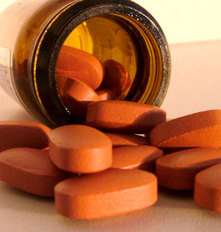 One of the things that my integrative physician discovered when he ran a big battery of tests on me last fall was that I had a low vitamin D level in my blood. This was not surprising–I’m a religious sunscreen wearer and most vitamin D comes from sun exposure. Nor was it unusual–one study last year showed more than 3/4 of the American population walks around with a vitamin D deficiency.
One of the things that my integrative physician discovered when he ran a big battery of tests on me last fall was that I had a low vitamin D level in my blood. This was not surprising–I’m a religious sunscreen wearer and most vitamin D comes from sun exposure. Nor was it unusual–one study last year showed more than 3/4 of the American population walks around with a vitamin D deficiency.
Back in the fall, my level was 22 ng/mL, and my doctor wanted to see that at least double. So I started a serious supplementation program – 50,000 IUs each week. Vitamin D, unlike its water-soluble cousin vitamin C, is oil-soluble, so a weekly dose unfurls into your bloodstream nice and steady. 7,000 IUs a day is an optimal dose for someone trying to replenish their system, said my doc.
Eight weeks into this regimen, and my vitamin D level is up to 39–almost the doubling he was looking for. Plus, I feel better – more “plugged in,” better able to concentrate, and more awake.
But now what? What is the right “maintenance” dose to keep myself supplemented, but not overly-dosed? My primary care doctor recommends 400 IUs a day for a year. Dr. Andrew Weil–the famous integrative doc–has raised his healthy-person recommended dose from 1,000 IUs to 2,000 IUs a day. The Vitamin D Council advises 5,000 daily IUs while deficient, and then adjusting to whatever dose gets you to 50-80 ng/mL (which I’m not yet at).
All this from a vitamin for which there are very few food sources–milk, eggs, and oily fish basically sum it up.
I’m sure I’m not the only one whose head is spinning–and given that vitamin D is crucial to the prevention of cancer, cardiovascular disease, diabetes, autoimmune disorders, and the common cold, the stakes are high to get this right.
Here are some tips from Dr. Weil:
1. Take vitamin D supplements with fat-containing foods to help with absorption.
2. Be extra D-vigilant if you are older–the ability to synthesize vitamin D declines with age.
3. Don’t count on the sun: for half the year, latitudes north of Atlanta, GA are too steeply angled to give us vitamin D-worthy rays.
How have you sorted out the vitamin D debacle? How have you balanced diet, sun exposure, and supplementation to make sure you get this important vitamin into your system?
(image via: http://mycanceradvisor.com/)
Like what you see? Click here to subscribe and get Fresh Living in your in-box every day!

